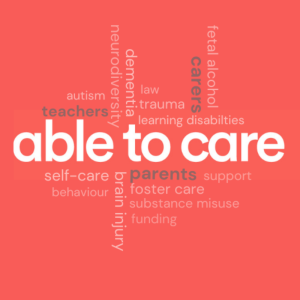
Tuesday Apr 16, 2024
The problem with punishment - Its time to forget the stick
In this thought-provoking episode of the "Able to Care" podcast, hosts Andy and Nadine explore the intricacies of behavioural management and its implications in caregiving. This discussion delves into real-life case scenarios, shedding light on the often complex nature of behaviour and its roots, as well as the consequences of traditional punitive measures. The episode challenges conventional behaviourist approaches and offers insights into more empathetic and effective strategies.
Key Moments:
- 00:21 - Introduction by Andy and co-host Nadine Sutton.
- 00:32 - Discussion on a specific behavioural case.
- 04:08 - Examination of 'setting events' and their impact on behaviour.
- 05:13 - Exploration of justice and consequences in behavioural management.
- 06:28 - Critique of traditional behaviourist principles and their application.
- 08:05 - Discussion on the limitations of cause and effect understanding in behaviourism.
- 10:09 - Historical context of punishment in schools and its effects.
- 12:14 - The concept of learned helplessness and its psychological impact.
- 16:19 - Shifting perspectives from punitive to more rehabilitative models.
- 20:01 - The 'epilepsy' analogy to illustrate uncontrollable behaviours.
- 24:05 - The importance of social learning over punitive methods.
- 27:25 - Discussion on consistent negative outcomes and their effect on long-term behaviour.
- 30:13 - Closing thoughts on appropriate consequences and the future of caregiving.
Key Messages:
Behavioural Understanding: It's crucial to understand the underlying causes and contributing factors of behaviours rather than just the behaviours themselves.
Empathy over Punishment: Emphasizing empathy and understanding can lead to more effective caregiving and less reliance on punitive measures that often fail to address the root causes of behaviours.
Immediate Consequences: Immediate and understandable consequences are more effective, especially for individuals with cognitive differences like ADHD.
Learned Helplessness: Punitive approaches can lead to learned helplessness, where individuals no longer attempt to improve due to a belief that their efforts do not affect outcomes.
Societal and Cultural Shifts: There is a need for a shift in societal and cultural approaches to behaviour management, from a punitive model to one that focuses on teaching and rehabilitation.
Remember to subscribe and leave us a review if you found this episode valuable. Your feedback helps us grow and improve.
Enjoyed this episode? Don't miss out on future conversations! Make sure to subscribe to our podcast for upcoming episodes featuring insightful guests and fantastic hosts.
Stay connected! Follow us on social media [@abletraining on LinkedIn, Facebook and Instagram, @abletocarepodcast on TikTok) for behind-the-scenes content, updates, and community engagement.
Want to delve deeper into topics discussed on the show? Visit our training website https://www.able-training.co.uk/ for valuable resources and courses to support caregivers on their journey.
Thank you for listening! Your support means the world to us. Stay tuned for more inspiring conversations
#AbleToCarePodcast #BehaviourManagement #EmpathyInCaregiving #PositiveOutcomes #UnderstandingBehaviour #LearnedHelplessness #SocialLearning #TherapeuticParenting #BehavioralInsights #PunishmentVsEducation #CaregivingChallenges #MentalHealthAwareness #ADHD #Autism #behaviour # positivebehavioursupport #care #punishement#parenting #teachers #carers #Neurodiversity
No comments yet. Be the first to say something!